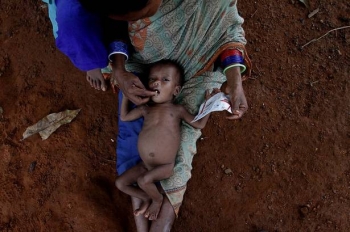
.png) Aarti
Aarti
.jpg)
Yes, the writing on the wall seems to be clear. That it's time for some serious introspection as far as child nutrition is concerned.
Although the first set of findings from the National Family Health Survey (NFHS-5) conducted in 2019-20 and released recently relates to only 22 states and 5 Union territories excluding major states like Madhya Pradesh, Tamil Nadu and Uttar Pradesh, it points to worsening malnutrition and anaemia in several states.
Apart from Karnataka, Andhra Pradesh and Sikkim, reporting marginal improvements in the nutrition status of kids under the age of 5 years compared to NFHS-4 conducted in 2015, the cause for concern amongst the remaining 19 states the greater burden of either one or two or all of the three indicators of malnutrition that is (i) stunting (low height for age), (ii) wasting (low weight for height) and (ii) underweight (low weight for age). Anaemia is growing among children in Kerala that usually leads other states in social policies.
So what are the implications? If a recent Lancet study is to be believed, the effects of malnourishment in a small child is just not physical. A developing brain that is deprived of nutrients does not reach its full mental potential. Therefore, under-nutrition can affect cognitive development by causing direct structural damage to the brain and by impairing infant motor development. This in turn can affect the child’s ability to learn at school, leading to a lifetime of poverty and lack of opportunity. Such disadvantaged children are likely to do poorly in school and subsequently have low incomes, high fertility and provide poor care for their children, thus contributing to the intergenerational transmission of poverty. In short, today’s poor hungry children are likely to be tomorrow’s hungry, unemployed and undereducated adults.
Indeed it is disconcerting that the proportion of stunted children has seen an increase. Studies have shown that stunting is an indicator of chronic or recurrent under nutrition, usually associated with poor socioeconomic conditions, poor maternal health and nutrition, frequent illness, and/or inappropriate infant and young child feeding and care in early life. Importantly, children who suffer from stunting may not grow to their full height. Besides, there is also a risk that they would not develop their full cognitive potential.
Malnutrition, defined as ill health caused by deficiencies of calories, protein, vitamins and minerals poses a variety of threats to children as well as women. NFHS-4 (conducted in 2015-16) found that 22.9% women (15-49 years of age) are underweight (BMI less than 18.5 kg/m2). The five States having highest percentage of malnutrition among women are Jharkhand (31.5%), Bihar (30.4%), Dadra and Nagar Haveli (28.7%), Madhya Pradesh (28.4%), Gujarat (27.2%) and Rajasthan (27%). There is also increasing concern about the possibility that maternal malnutrition may contribute to the growing burden of cardiovascular and other non-communicable diseases of adults in less developed countries.
According to reports, the poorest sections of society are often caught in a trap of poverty and malnutrition, which is being passed on from generation to generation. Mothers who are hungry and malnourished produce children who are stunted, underweight and unlikely to develop to achieve their full human potential. Several studies have found that adequate nutrition, a fundamental cornerstone of any individual’s health, is especially critical for women because inadequate nutrition wreaks havoc not only on her own health but also on the health of her children.
An adverse impact is that children of malnourished women are more likely to face cognitive impairments, short stature, lower resistance to infections besides a higher risk of disease and death throughout their lives. Malnutrition also weakens women’s ability to survive childbirth, makes them more susceptible to infections, and leaves them with fewer reserves to recover from illness. Malnutrition may not be a direct cause of death among children. However, it can increase morbidity and mortality by reducing resistance to infections as malnourished children are more vulnerable to any infection than normal children.
To address aspects related to nutrition, several centrally sponsored schemes being implemented through States/Union Territories like the Pradhan Mantri Matru Vandana Yojana, Anganwadi Services and Scheme for Adolescent Girls under the Umbrella Integrated Child Development Services Scheme (ICDS) are direct targeted interventions to address the problem of malnutrition among pregnant women, lactating mothers and children (0-6 years of age).
The Poshan Abhiyaan in operation for the last three years aims to achieve improvement in nutritional status of Children from 0-6 years, adolescent girls, pregnant women and lactating mothers in a time bound manner. Specifically, the Scheme intends to prevent and reduce stunting in children (0- 6 years) by 2% every year; prevent and reduce under-nutrition (underweight prevalence) in children (0-6 years) by 2% every year; reduce the prevalence of anaemia among young children (6-59 months by 3% every year; reduce the prevalence of anaemia among women and adolescent girls in the age group of 15-49 years by 3% every year and reduce low birth weight by 2% every year. But when it comes to utilisation of funds by states and union territories, there are gaps. For instance out of Rs 428640.17 lakh released for Poshan Abhiyaan since 2017 up to 31 December 2019, the utilisation has been Rs 157607.95 lakh.
The underfed hugely outnumber the overfed. But alongside the crisis of child under-nutrition, there is also a rise in child obesity. Are our children consuming more junk food? As evidence clearly points that nutrition is a big factor in disease prevention and its management, there is an imperative need, at a societal level, that families take control of kitchen and restrict kids from falling prey to food manufacturers including fast food and restaurants, more so because increasing obesity rates among young children seem to pose several challenges across the globe and India is no exception.
It needs to be appreciated that adequate nutrition is important for children as well as women because it helps them be productive members of society.